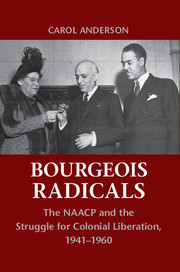Book contents
- Frontmatter
- Dedication
- Contents
- List of Figures
- Acknowledgments
- Introduction De-Centering Du Bois
- 1 Rising Wind
- 2 “The White Man’s Burden Has Not Been Very Heavy”
- 3 “An Even Larger Issue Than ‘Containing Communism’”
- 4 So Weak, So Seventeenth Century
- 5 Regime Change
- Conclusion Beyond the Single Story
- Bibliography
- Index
- References
4 - So Weak, So Seventeenth Century
Indonesia and the Domestic Jurisdiction of Dutch Colonialism
Published online by Cambridge University Press: 05 December 2014
- Frontmatter
- Dedication
- Contents
- List of Figures
- Acknowledgments
- Introduction De-Centering Du Bois
- 1 Rising Wind
- 2 “The White Man’s Burden Has Not Been Very Heavy”
- 3 “An Even Larger Issue Than ‘Containing Communism’”
- 4 So Weak, So Seventeenth Century
- 5 Regime Change
- Conclusion Beyond the Single Story
- Bibliography
- Index
- References
Summary
“In the case of the ... Dutch ... colonies” any plans for eventual equality “cannot be carried out if these areas ... continue to be regarded as territory for trade, industry and investment to be carried on primarily for the benefit of non-resident Europeans without making the economic and social interests of the inhabitants of the colonies of first and continuous importance.”
– NAACP Colonial Conference, 1945At the same time that the NAACP was helping with the battle against colonialism on the African continent – not to mention fighting Jim Crow at home – the Association’s attention was drawn to the Indonesians’ epic struggle for freedom, which was taking place more than 10,000 miles away in Southeast Asia. Because this battle played out primarily in the Security Council, which was less amenable to the suasion of appointed representatives and the lobbying of other delegations in the halls, the NAACP did not and could not play as direct a role.
Nonetheless, this did not signal impotency. On the contrary, the Association adopted a strategy that was an essential component in the campaign for Indonesian independence. Working closely with an interlocked network of NGOs, such as the Post-War World Council, the ILRM, and the India League, the NAACP identified the key weakness in Holland’s colonial argument (domestic jurisdiction) and the necessary levers (the Marshall Plan and public opinion) to knock the imperial power off its stride. Of course, the confluence of interests – major pillars of U.S. foreign policy threatened, a seemingly viable nationalist alternative to indigenous Communists, and the Netherlands’ uncanny ability to anger allies and enemies alike – was incredibly fortuitous and necessary. But without the mobilization of an enraged public that vented its disbelief when U.S. funds intended for rebuilding Nazi-ravaged democracies were actually being used in the destruction of a viable Republic, the State Department would have had neither the leverage nor probably the will to take the tough stand that eventually broke the Dutch refusal to negotiate.
- Type
- Chapter
- Information
- Bourgeois RadicalsThe NAACP and the Struggle for Colonial Liberation, 1941–1960, pp. 204 - 267Publisher: Cambridge University PressPrint publication year: 2014

